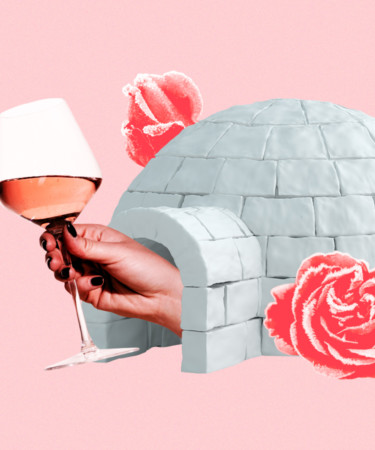Each June, thirsty beachgoers and rooftop partiers flock to wine shops to snag bottles of their favorite rosé wines, only to leave them behind as the weather cools down.
But according to Anna-Christina Cabrales, founder of SOMMATION and education manager at Independence Wine and Spirits, there’s no real reason to reserve rosé for the summertime. VinePair consulted the sommelier for her thoughts on sipping the so-called “summer water” year-round.
“Rosé is generally so lively, refreshing, and higher in acidity,” Cabrales says. “That makes it easy to sip poolside or at a picnic with friends.” While the category is generally marketed as fun and quaffable, Cabrales says plenty of prestigious wineries are dedicating entire plots and vineyard sites solely to its production.
Especially if you give them time to develop in-bottle, many rosés can be just as well suited for holiday tables as Fourth of July soirées. “I like to buy rosé from southern France in large-format [bottles] at the end of the summer, when these wines are on closeout,” Cabrales says. “I’ll buy a few, age them for a year, and then I’ll [bring]that magnum to Thanksgiving dinner.”
Months of aging relaxes rosé’s zippy acidity, deepening the presence of strawberry and watermelon fruit and making the wine ideal for pairing with the natural sweetness of caramelized pork and roasted winter vegetables. Of course, not all rosés are meant to be aged. Cabrales recommends aging bottles made with thicker-skinned grapes like Cabernet Franc, Xinomavro, Mourvèdre, and even Pinot Noir; if a red wine is ideal for cellaring, a rosé made from the same varietal will generally also age beautifully.
To make rosé even riper for winter sipping, try serving it at a slightly higher temperature than you would your typical whites and rosés — closer to 60 degrees Fahrenheit — and in a wide-mouthed glass; Cabrales recommends the Zalto Universal glass for a full aromatic experience that highlights the wine’s bright florals.
Though rosé may not be the most obvious beverage to choose when puffer coats and snow boots are in play, it’s a fun way to make winter a bit more palatable. “I highly recommend storing a bottle in the back of a closet, forgetting about it for a while, and celebrating with friends during the [December] holidays where a rosé can totally be appreciated,” Cabrales explains.
